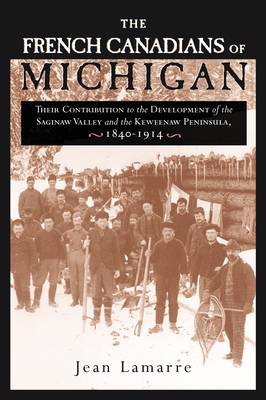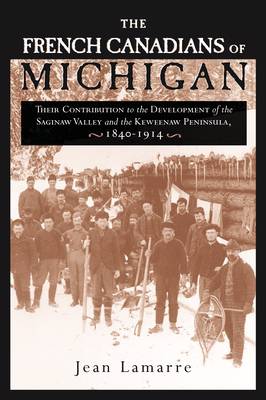
- Afhalen na 1 uur in een winkel met voorraad
- Gratis thuislevering in België vanaf € 30
- Ruim aanbod met 7 miljoen producten
- Afhalen na 1 uur in een winkel met voorraad
- Gratis thuislevering in België vanaf € 30
- Ruim aanbod met 7 miljoen producten
The French Canadians of Michigan
Their Contribution to the Development of the Saginaw Valley and the Keweenaw Peninsula, 1840-1914
Jean LamarreOmschrijving
The first major study of the migration of French Canadians to Michigan during the nineteenth century and their substantial impact on the state's development.
Most information regarding the French Canadians in Michigan concerns those who settled during the French period. However, another significant migration occurred during the industrial period of the nineteenth century, when many French Canadians settled in the Saginaw Valley and on the Keweenaw Peninsula--two regions characteristic of Michigan's economic development in the nineteenth century. The lumber industry of the Saginaw Valley and the copper mines of the Keweenaw Peninsula provided very different challenges to French Canadian settlers as they tried to find ways to adapt to changing environments and industrial realities.
The French Canadians of Michigan looks at the factors behind the French Canadian immigration by providing a statistical profile of the migratory movement as well as analysis of the strategies used by French Canadians to cope with and adapt to new environments. Using federal manuscript censuses, parochial archives, and government reports, Jean Lamarre closely examines who the immigrants were, the causes of their migration, their social and geographical itinerary, and the reasons they chose Michigan as their destination. Besides comparing the different settlements in the Saginaw Valley and the Keweenaw Peninsula, Lamarre also compares the Michigan French Canadians to the French Canadians who settled in New England during the same period. This book is a major contribution to the study of the French Canadian migration to the Midwest and will be valuable to researchers of both Michigan and French Canadian history.
Specificaties
Betrokkenen
- Auteur(s):
- Uitgeverij:
Inhoud
- Aantal bladzijden:
- 232
- Taal:
- Engels
- Reeks:
Eigenschappen
- Productcode (EAN):
- 9780814331583
- Verschijningsdatum:
- 1/05/2003
- Uitvoering:
- Paperback
- Formaat:
- Trade paperback (VS)
- Afmetingen:
- 162 mm x 228 mm
- Gewicht:
- 381 g

Alleen bij Standaard Boekhandel
Beoordelingen
We publiceren alleen reviews die voldoen aan de voorwaarden voor reviews. Bekijk onze voorwaarden voor reviews.









